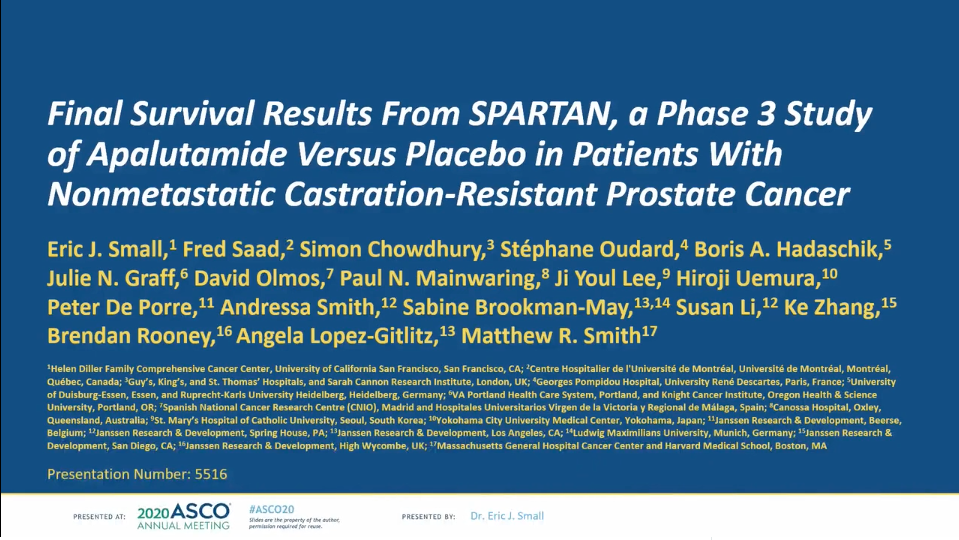Prof. Pirus Ghadjar (Charité Universitätsmedizin Berlin, Germany) presented the results of the SAKK 09/10 trial (NCT01272050), an open-label, multicentre, randomised phase 3 trial that sought to compare the effectiveness of 2 salvage radiotherapy regimes for the treatment of patients who had relapsing prostate cancer following radical prostatectomy [1]. Relapse was defined as 2 consecutive rises in prostate-specific antigen (PSA) level with the second rising value >0.1 ng/mL, or 3 consecutive rises.
Patients (n=350) were randomised 1:1 to receive either conventional-dose radiotherapy (64 Gray [Gy] in 32 fractions administered over 6.4 weeks) or dose-intensified radiotherapy (70 Gy in 35 fractions administered over 7 weeks) directed to the prostate bed.
The primary endpoint was freedom from biochemical progression (defined as PSA ≥0.4 ng/mL and rising). At 6 years, freedom from biochemical progression was 62.3% versus 61.3% for the 64 Gy versus the 70 Gy arm, respectively, with an HR of 1.14 (95% CI 0.82–1.60; log-rank P=0.44).
Secondary endpoints included clinical progression-free survival, time to hormonal treatment, and overall survival. These outcome measures were not significantly different between the treatment groups.
Genitourinary (GU) and gastrointestinal (GI) toxicity were tracked as well. GU toxicity was not significantly different between the groups; however, the higher-dose protocol was associated with increased GI toxicity.
- Ghadjar P. Dose-intensified versus conventional dose-salvage radiotherapy for biochemically recurrent prostate cancer after prostatectomy: Six-year outcomes of the SAKK 09/10 randomised phase 3 trial. Abstract 194, ASCO Genitourinary Cancers Symposium, 11–13 February 2021.
Copyright ©2021 Medicom Medical Publishers
Posted on
Previous Article
« Intrinsic tumour biology may be predictive of treatment response in prostate cancer Next Article
Apalutamide prolongs progression-free survival in prostate cancer »
« Intrinsic tumour biology may be predictive of treatment response in prostate cancer Next Article
Apalutamide prolongs progression-free survival in prostate cancer »
Table of Contents: ASCO GU 2021
Featured articles
Prostate Cancer
Lu177 as a promising new therapy for metastatic prostate cancer
Role of prostate cancer genomics is evolving
Apalutamide prolongs progression-free survival in prostate cancer
Dose-intensified radiation therapy fails to provide better outcomes in prostate cancer
Intrinsic tumour biology may be predictive of treatment response in prostate cancer
Final TITAN trial results favour use of apalutamide
Penile Cancer
Prognosis of penile cancer associated with HPV status
Renal Cancer
Superior clinical outcomes and QoL with nivolumab plus cabozantinib in RCC
Lenvatinib plus pembrolizumab prolongs survival in renal cell carcinoma
Inflammatory markers may guide treatment decisions in metastatic renal cell cancer
Clinical trial exclusion criteria may lead to lack of evidence in real-world patients: how do the excluded fare?
Axitinib offers hope for improving renal cell cancer surgical outcomes
Cabozantinib as possible new first-line therapy in translocation renal cell carcinoma
Predictors of oral anti-cancer agent utilisation in renal cell carcinoma
Denosumab plus pembrolizumab in advanced clear cell renal cell carcinoma
Testicular Cancer
New prediction model for brain metastasis in germ cell tumours
Reduction in radiation exposure is possible in testicular seminoma surveillance
New therapeutic option for early metastatic seminoma
Urothelial Cancer
Poorer outcomes in bladder cancer predicted by race/ethnicity and gender
Enfortumab vedotin as a promising treatment option for bladder cancer: phase 3 results
Enfortumab vedotin as a promising treatment option for bladder cancer: phase 2 results
New standard of care recommended for patients with upper tract urothelial cancer
Signature DNA alterations in subtypes of bladder cancer
ACE inhibitors associated with superior responses in bladder cancer
Better allocation of research dollars needed
Better prediction of favourable responses to immune checkpoint inhibitors in mUC
Genitourinary Oncology
Researchers call for an overhaul of licensing and funding of anti-cancer drugs
Exploring a new strategy for metastatic germ cell tumours
Related Articles

September 17, 2020
Final survival results from phase 3 SPARTAN trial
February 18, 2021
Transient drop in erectile function seen after prostate biopsy
August 31, 2021
Residual tumour resection in case of elevated markers
© 2024 Medicom Medical Publishers. All rights reserved. Terms and Conditions | Privacy Policy
HEAD OFFICE
Laarderhoogtweg 25
1101 EB Amsterdam
The Netherlands
T: +31 85 4012 560
E: publishers@medicom-publishers.com

